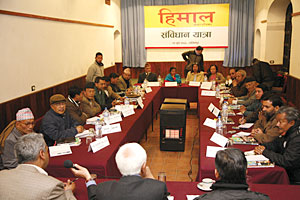The final session of Himal Khabarpatrika's Constitution Yatra took place, fittingly, in the Kathmandu Valley. A lively debate ensued between those in favour of federalism and those who felt the decision to implement federalism was too hasty. But there was a consensus on the pitfalls of ethnic federalism.
On the constitution-writing process 
Keshar Bahadur Bista (Rastriya Janashakti Party): Federalism is understood in writing but not reality. While many good things occurred after the historic movement, some decisions were taken hastily, like the decision to write the constitution in two years. In fact, only two countries in the world have completed a constitution through a CA within two years. It usually takes 4-12 years. We have only five months left but the constitution-writing process has just begun. We should seek the help of experts and complete the task. Nehru appointed constitutional expert Ambedkar, who was not a member of the CA, and his team completed the constitution in four years. America, India, Australia took a long time not because their CAs were weak or incapable, but because a lot of deliberation went into constitution-writing. If the constitution is written in hurry, it might cause conflicts in the future.
Lokesh Dhakal (NC): Talking about federalism, we wonder how many states Kathmandu will have. Political parties jumped to federalism without discussing its pros and cons in a country with diversity in ethnicities, languages and geography. But we cannot go back on our commitment. It is unlikely the constitution will be written on time given the pace and current situation of the country.
Rameshwor Phuyal (UML): The peace process benefited only the rebels. We are in this situation because political parties weren't far-sighted after mainstreaming the rebels. The PLA integration process was not completed in the stipulated time. We could not safeguard the achievements of 1950 and 1990 in the past and what if we fail to safeguard the achievements of the Jana Andolan this time?
On the capital and federalism
Keshab Man Shakya (Nepa: Rastriya Party): The voice of federalism was raised to end the colonisation of one caste, language and culture for 240 years. However, federalism is not the solution until cultural discrimination is resolved. With the Shah dynasty gone, Bahun rule has begun. We need federalism in order to avert future conflict.
Raj Kaji Maharjan (UCPN-M): The point of federalism is to challenge a feudal unitary state, and resolve ethnic problems, not worsen them. It should be based on culture, georgraphy, economy and population. Giving privilege to a particular caste will not resolve the problems. Newars are in majority in the capital but it does not mean Bahun, Chhetris and other castes will be banished. It is their right to lead in the region where they are a majority.
Kaushar Shah (Muslim Association): The constitution-writing process has been delayed due to the Maoists' greed for power. As they failed to implement the 12-point agreement, there is no decline in the incidents of murder, violence and intimidation. Federalism should end gender, social, geographical, lingual and cultural discrimination. Muslims are natives of the capital as they have been living here for over 700 years, and their contributions should be acknowledged; what would they do in a Newar state?
Narayan Koju (NPWP): Ethnicity should not be the basis for state restructuring. We should make sure that natural resources are distributed evenly. No one caste is dominant everywhere, and not all conflicts are caste based. Last year, Gurungs murdered Gurungs for yarshagumba in Manang.
Nirmal Pode (Dalit): Provinces should be based on natural resources, not caste. There are Brahmins, Chhetris, Baishyas and Sudras within the Newar community. How ever much we deny it, caste systems prevail even in this community. What will happen to those who are discriminated within communities in new Nepal?
READ ALSO:
Constitution 2010, Nepali Times coverage of issues related to writing the new constitution


